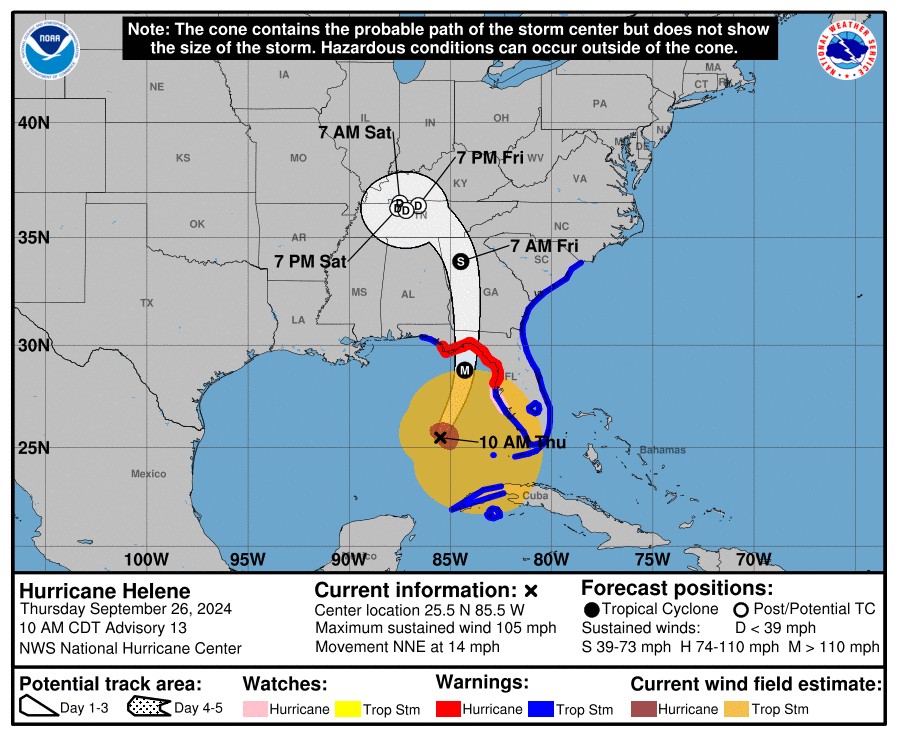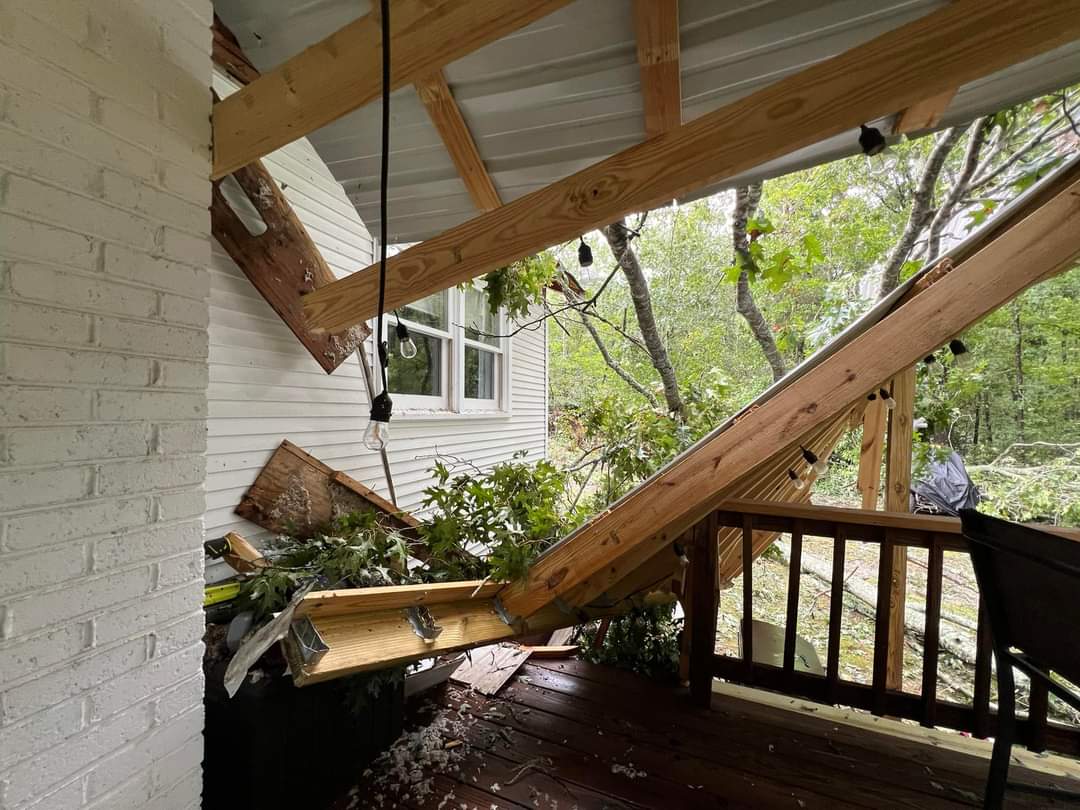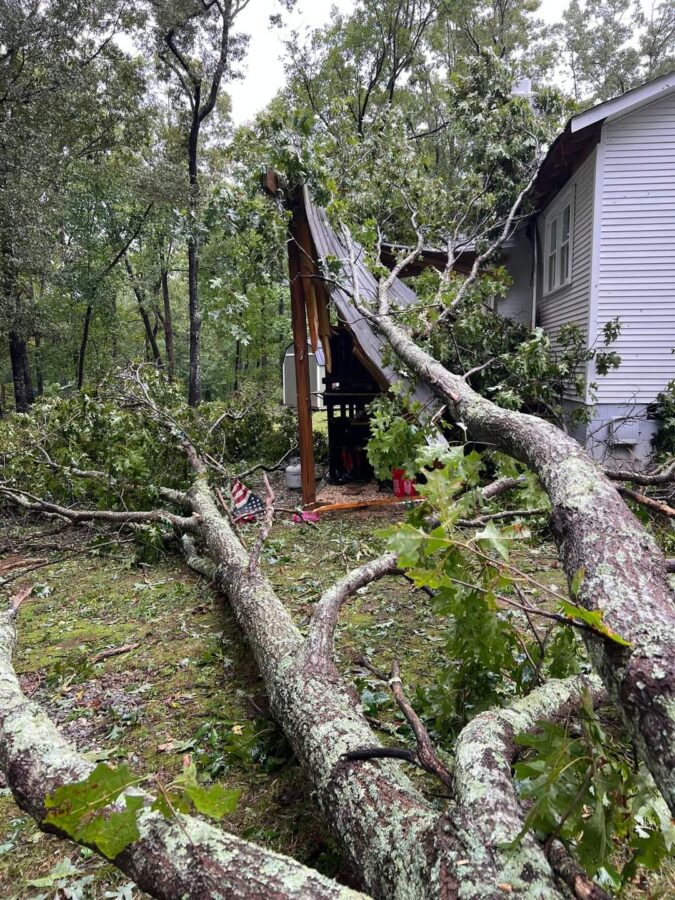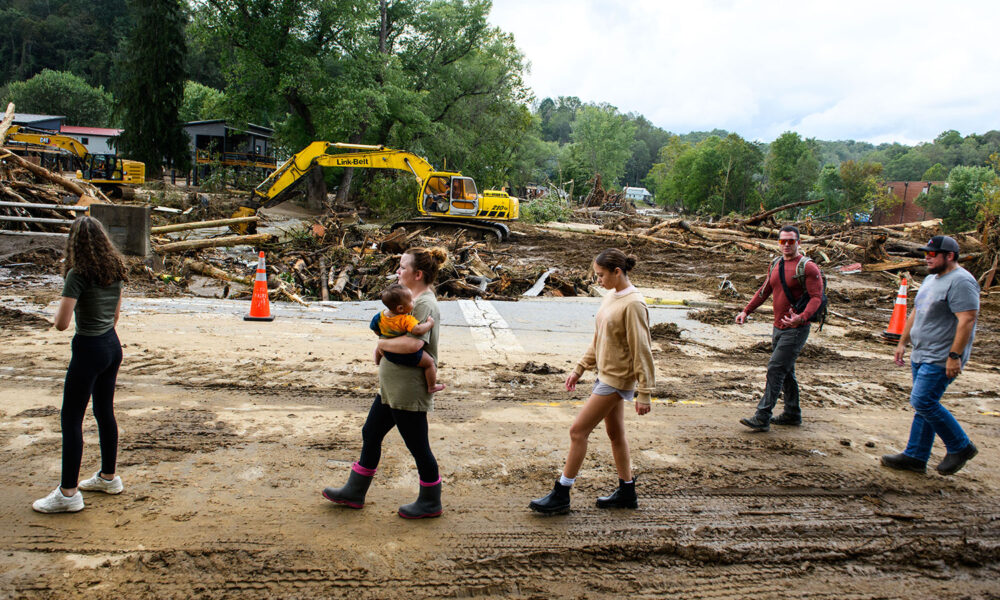Hurricane Helene has left an 800-mile path of destruction across Florida, Georgia, Tennessee, North Carolina, South Carolina, Virginia, and Kentucky. Right now, people are desperately waiting to hear from loved ones to confirm their safety, while others are living their worst fears as the death toll rises.
My heart is heavy. The grief of yet another climate-changed event is overwhelming. I am writing this post to share how this disaster has affected people I care about and to share resources for folks looking to support organizations on the ground helping survivors access critical food, water, and shelter (see list below).
Alongside the incredible mutual aid efforts, the Federal Emergency Management Agency (FEMA) must coordinate and support equitable recovery efforts, and Congress should provide robust funding for the agency to do its job to help communities get back on their feet.
What happened
Last Thursday, Hurricane Helene rapidly intensified to a Category 4 storm before making landfall in Florida. Schools in Kentucky, where I live, and Indiana announced closures for Friday, September 27 in anticipation of the storm.
That’s right—schools closed in Kentucky for a hurricane.
The image (below) from the National Weather Service suggested that the storm would make a straight shot toward Kentucky as it progressed inland. I feared strong winds, spin-up tornadoes, downed trees, and power outages. I’m living in the new tornado alley, and we’ve had damaging winds and storms more often lately—so it made sense to be prepared for severe weather.

While my power went out for a few minutes and flickered off a few times throughout the day, it was much calmer in Louisville than I anticipated. Several counties in eastern Kentucky declared states of emergency due to wind damage, power outages, and flooding. Personally, I was relieved to finally hear from my relatives in Greenville County, South Carolina confirming they were safe. Though, my cousin and his baby had a scary close call—they were only a few feet away inside their house when a tree crashed down on their deck.

The aftermath of Helene is proving the worst of what we imagine in the face of climate change. I asked my colleague, Dr. Marc Alessi, an atmospheric scientist, about the hurricane. Here’s what Marc had to say:
“Helene was an example of what hurricanes will look more like in the future. With ocean surface temperatures more than 2 degrees Celsius above normal in the Gulf of Mexico and Caribbean Sea, Helene was able to rapidly intensify to a Category 4 hurricane before making landfall in Florida. Helene was well forecasted by the National Hurricane Center, which accurately predicted its rapid intensification and extreme rainfall amounts in southern Appalachia.
“Despite the warning, Helene’s torrential rain and winds brought devastation to western North Carolina, eastern Tennessee, western Virginia, and eastern Kentucky. Some areas received over 2 feet of rain in a short time period, breaking rainfall records for most areas in southern Appalachia. Rivers crested above record levels set by The Great Flood of 1916, which brought similar devastation to the Asheville, NC region. According to a provisional rapid attribution study human-caused climate change may explain up to 50% of Helene’s record-breaking rainfall amounts. Needless to say, this storm is of historic proportions and will be remembered by folks in this region for decades to come.”
Given the warming ocean surface temperatures, rapid intensification of hurricanes is happening more often. That means that, because of climate change, we need to be prepared for more destructive storms like Helene.
“It’s imperative that local, state, and federal policymakers and emergency planners help keep communities safe by prioritizing investments to get homes, businesses, and infrastructure in frontline communities climate-ready and be prepared to ensure a quick and just recovery should disaster strike. Reining in heat-trapping emissions driving the climate crisis is also essential,” Dr. Astrid Caldas, senior climate scientist for community resilience, says.
How you can help
The road to recovery will be long, and it is important to get money to folks on the ground to assist those impacted directly. Here is a short, not exhaustive, list that some of my Southeast colleagues and I have pulled together of organizations we know, love, and trust. Please consider donating and sharing this information on social media.
- The Southeast Climate and Energy Network: UCS is a member organization of SCEN. Donations should be tagged with “Helene.”
- The Appalachia Funder’s Network has launched the Appalachian Helene Response Fund. Donations will be received through the Foundation for Appalachian Kentucky and channeled directly to areas of greatest need in the region.
- Appalachian Voices: our union siblings (UCS United and Appalachian Voices Workers Union are both represented by the Progressive Workers Union), has a list of resources for ways to give, for folks seeking shelter, for finding missing loved ones, and more.
FEMA has additional information, including how to be aware of scams during disaster response. And, if you or someone you know is experiencing distress, please reach out for help from the Disaster Distress Helpline. Call or text: 1-800-985-5990.

What’s next?
I consider myself lucky to work every day with my colleagues and folks around the country to build community resilience to climate change. At the same time, there is so much more we need to do to keep the people and places we love safe. It can be demoralizing when fossil fuel companies’ interests seem valued over human lives, and it’s infuriating when elected officials fail to do the right thing.
What is happening now, from the Gulf Coast of Florida to the mountains of Appalachia, is our reality. It is the reason we must continue to push forward, demanding a wide-scale switch to clean and renewable energy and holding fossil fuel companies accountable for the harm that burning their products is causing.
No matter what, we must be here for each other. Let’s support those in the aftermath of Hurricane Helene now and let’s commit to advocating for communities to get the investments they need before the next storm.

